
Tina Krombach
Note — The article was checked and updated June 2023.
Autogenic training is an effective and well-researched method to prevent and relieve many medical conditions, through calming the mind and relaxing the body.
We will look into more detail how autogenic training can minimize and prevent stress-induced disorders, and also provide health benefits for
- heart disease
- chronic pain
- hypertension
- sleep
and several other conditions.
Research on Autogenic Training and medical conditions
Since 1926, autogenic training has been applied by therapists to treat various mental and physical conditions of their patients. Beyond that, the personal use of this relaxation technique has proven to be beneficial for ailments and diseases, some of which we have listed below.
Asthma
Asthma is a chronic inflammatory disease of the lower airways and can be allergic or non-allergic.

The common symptoms occur in episodes that are mostly either triggered by allergens or distress. These include wheezing, coughing, chest tightness and shortness of breath. Autogenic training provides a long-term benefit of the complementary treatment of asthma.[1]
Anxiety
When suffering from anxiety, the mind is busy with exaggerated worrying and constantly develops fearful thoughts. Focussing on the breathing makes us feel more centered and can dissolve physical tension, restlessness, eases sweating and a racing heart.[2]
RELATED — Increase in Anxiety: Are we “The Anxious Generation”
Depression
Depression often comes in episodes that commonly include sadness or feeling empty and numb, irritability, low self-esteem, loss of interest and low motivation.
RELATED — Introduction to: Depression
Possible causes include other medical conditions, medical drugs, trauma and distress, hormonal imbalances and/or seasonal light deprivation.[3]
In practicing autogenic training, we can build up self-worth by better body awareness and self-induced balance.
Heart disease
Long-term stress and a continuous release of stress hormones can increase the common risk factors for heart disease. These comprise high blood pressure, high cholesterol and triglycerides as well as high blood sugar levels.
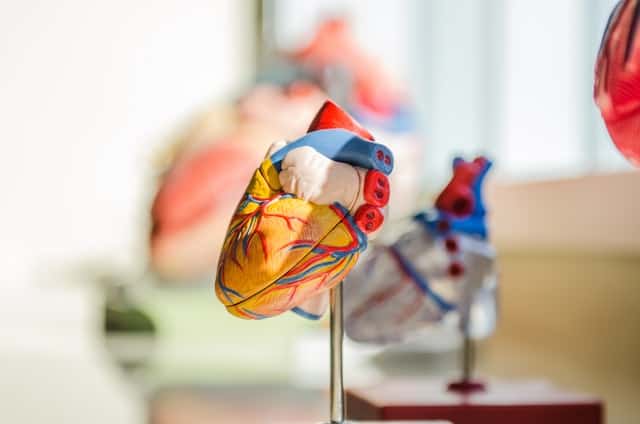
Since the heart is sensitive to emotions, anger, anxiety and depression can contribute to causes for coronary heart disease.[4]
Autogenic training as a self-relaxation increases our (stress) resilience and emotional balance.
Hypertension
Constant stress leads to changes that can result in plaque deposits in the arteries which contribute to high blood pressure or hypertension.
Even though symptoms such as episodical redness of the face, headaches, feeling pressure, dizziness or blurred vision and nosebleeds are rarely noticeable; ongoing hypertension is regarded as a risk factor for heart attack and stroke.
Medium exercise, relaxation techniques such as autogenic training, stress management and a balanced nutrition are important key factors in its prevention and natural treatment.
RELATED — The Healthy Plate Model: Essentials of Healthy Eating
(Tension) headaches
This is the most common type of headache, often described as a dull, aching pain and the sensation of tightness or pressure across the head.
Many people are also bothered by tenderness in the scalp, neck and shoulder muscles. Stress is the most commonly reported trigger for tension-type headaches.
That makes healthy habits, (self-)hypnosis and relaxation techniques effective non-drug treatments.[5]
Migraines
Migraine is a more continuous headache of neurological cause. It is often accompanied by visual disturbances, nausea or vomiting.
Physical activity can aggravate migraine pain
Since there can be an increased sensitivity to light and/or sound, retreating to a dark, silent room to rest is the best a sufferer of migraine can do.
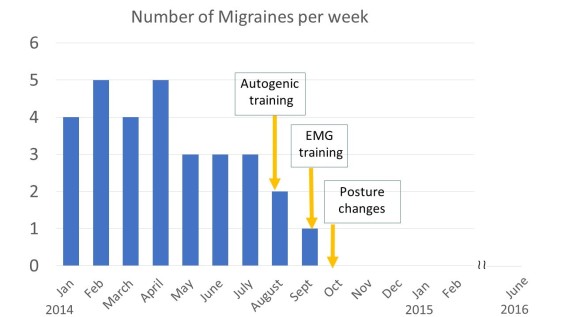
Autogenic training has shown to prolong the healthy intervals between migraine attacks which in my clinical experience take a milder course with the help of self-relaxation.
Chronic pain and tension
When pain and tension persist or recur for more than three months, it is called chronic.
It can be characterized by significant emotional distress (anxiety, anger, frustration or depressed mood) or functional disability that may interfere in daily life activities and affect social participation.
Autogenic training is one of the most well-established, well-researched methods of enhancing the body’s natural, self-recuperative mechanisms.
Raynaud’s disease
Cold temperatures and stress can cause spasms of small blood vessels which results in a reduced blood flow to fingers and toes.
During an episode of Raynaud’s the skin of (typically) the fingers usually first turn white, then they often turn blue and feel cold and numb. As they warm up the affected areas may turn red, throb, tingle or swell.
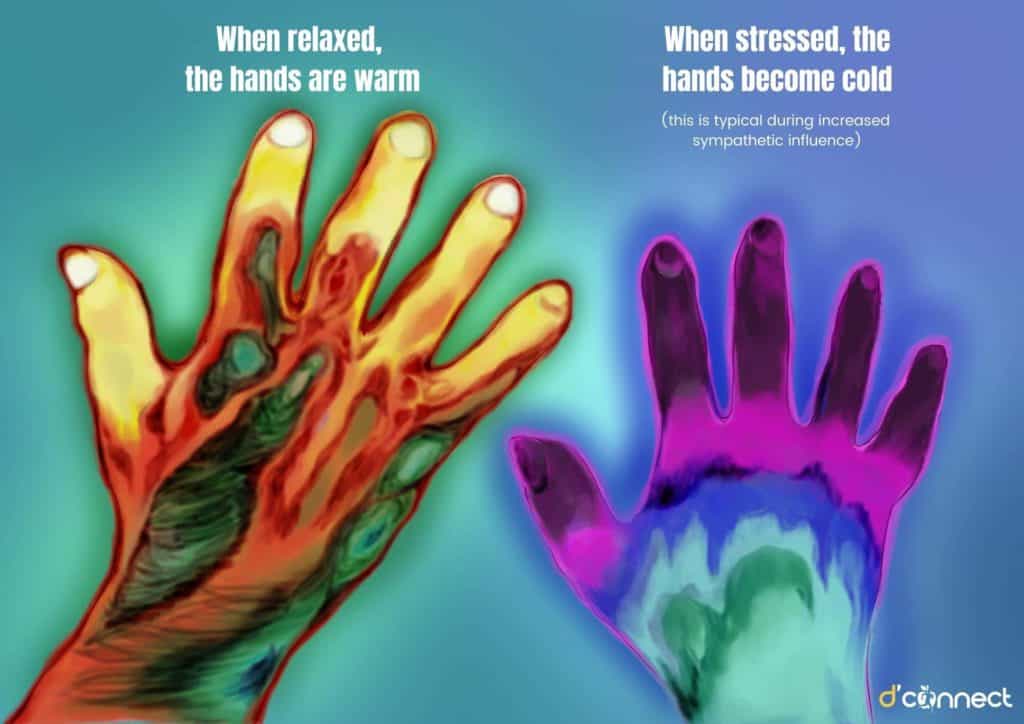
Autogenic training includes warming exercises which improve blood circulation and can prevent or help with Raynaud’s disease.
Sleep disorders and insomnia
Sleeping problems include difficulties with falling asleep, sleeping through the night and restless sleep. Usually it is called insomnia when the sleep disorder is a long-term problem.[6,7]
RELATED — Magnesium (for a great night of sleep)
A relaxation technique such as autogenic training decreases stress hormones, relaxes muscles and creates a sleep-like mode for body and mind.
Chronic fatigue (and exhaustion)
Fatigue can show as a prolonged physical and/or mental exhaustion, tiredness and muscle weakness and is commonly caused by chronic stress and changes in the release of (stress) hormones by the adrenal glands.
Autogenic training can effectively balance the hormones, beneficially affects the nervous system and increases the energy levels by the induced restorative relaxation.
Gastrointestinal diseases (acid reflux, IBS, Crohn's disease, and others)
Acid reflux or gastroesophageal reflux disease (GERD) occurs when stomach acid frequently flows back past the sphincter muscle into the esophagus and causes a burning sensation in the chest (heartburn) or even chest pain.
The relaxation technique such as autogenic training has a beneficial effect on muscle tone and the nervous system which can help both the sphincter of the stomach to function well and keep the stomach acid in place.
IBS and the chronic inflammatory bowel diseases include a prolonged and/or episodic change of bowel habits resulting from a functional disorder (IBS) or an inflammation (Crohn’s disease, colitis).
Clinical experience proves that the complex symptoms of these intestinal diseases can be reduced by calming the autonomic nervous system.[8,9]
Diabetes
One of the key factors of diabetes is a high level of the stress-hormone cortisol which increases the blood sugar level and can lead to insulin resistance.
RELATED — Diabetes: Early Signs, Causes, Types and Treatment
Autogenic training as a technique of self-hypnosis effectively lowers stress hormones and re-balances the nervous system so that a healthy metabolic function is supported.[10]
Obesity
The ongoing release of hormones including cortisol as a response to stress has an ill-effect on our metabolism. Cortisol shuts down metabolic and digestive functions which can contribute to overweight and obesity over time.
Self-relaxation such as autogenic training helps to balance the hormone levels, reduce stress hormones and support a healthy digestion.
Other stress-induced symptoms and diseases
These include adjustment disorders or stress response syndrome with varying symptoms. They can range from feeling sad, hopeless or not enjoying your favorite pastime anymore; frequent crying, anxious thoughts, nervousness, being irritable and overwhelmed.
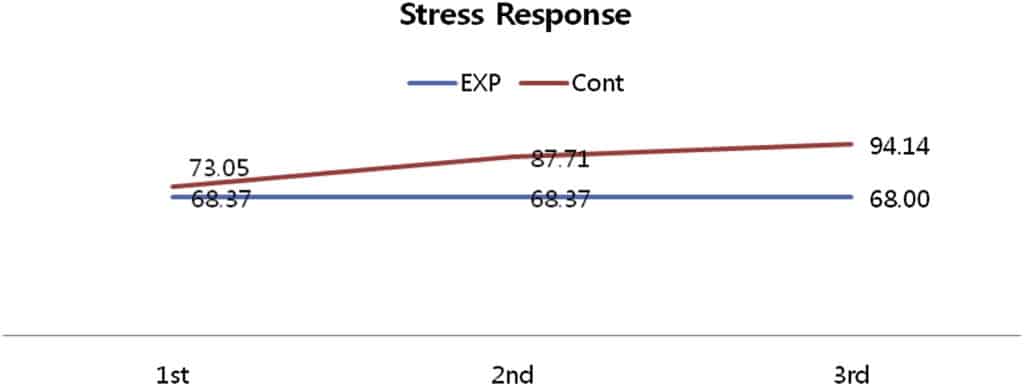
Some people withdraw themselves from social activities and can in extreme cases develop suicidal thoughts.
RELATED — Understanding Stress: The Silent Killer
As autogenic training is an effective technique for stress management, it can significantly ease the adaptation and response to stress and help with recovery.[11]
How to manage anxiety with Autogenic Training (social anxiety and gad)
Autogenic training enables the practicing person to relax the body and calm the mind as the need arises. Regular training empowers us to enhance our wellbeing, resulting in cognitive changes that effectively relieve anxiety.[12]
Continuous worrying, developing fearful thoughts and imagining worst-case scenarios are signs of anxiety. However, the topic of anxious worries can vary and that is how we distinguish social anxiety and generalised anxiety disorder (GAD).
The fear of social anxiety evolves around expressing oneself in front of others, meeting other people, being evaluated, judged or even rejected by others.

We define GAD by pathological worries about general life issues such as health, family matters, finances and minor things that do not appear to be a stressor to other people.
Both forms of anxiety are reinforced by focussing the mind on distressing future events that may or may not happen. In the state of deep relaxation and mindful concentration, the practitioner of autogenic training is anchored in the present moment.
The awareness of the breathing and being in the present moment disperse anxiety about future dilemmas. This relaxation technique grounds us in the very moment – there is no regret about the past, nor fear for future events, only here and now.
The mind can be trained to concentrate on tranquility, serenity and a positive perspective.[13]
Depression and Autogenic Training
Autogenic training, as a method of psychophysiological self-control, helps with depressive mood and is used therapeutically as a complementary treatment for depression.[14]
The trained affirmations and visualisations support the ability to self-motivate while relaxing the body and mind. Stress hormones are significantly reduced and neurotransmitters released which uplift the mood.
Furthermore, autogenic training and mindful relaxation beneficially affect the parasympathetic/restorative part of the autonomic nervous system, which is found to be dysregulated in depression.[15]
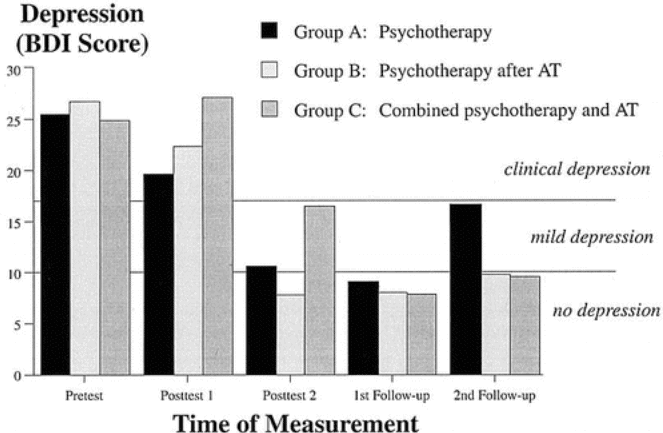
Furthermore, the restorative part is in charge of healthy digestion, which has a positive effect on the digestive tract and its microbiome, our good bacteria.
A healthy microbiome increases the production of the neurotransmitter serotonin which is much needed in conditions such as depression.
Last but not least, autogenic training teaches conscious breathing and induces deeper breathing. One of the results is an increased heart rate variability, the natural tendency of the heart to speed up and slow down with each breath.
A higher heart rate variability indicates not only a healthy heart but also overall wellbeing and improves depression.[16]
How Autogenic Training can help with fatigue
Fatigue as a prolonged physical and/or mental exhaustion, tiredness and muscle weakness can be a result of chronic stress and hormonal imbalance.
It is oftentimes paired with:
- Difficult and/or restless sleep
- Impaired decision making
- Irritability
Autogenic training can efficiently improve the energy levels by the induced restorative relaxation.[17]
The practice of autogenic training alters the brain’s activity and its frequency, resulting in increased brain efficiency, better concentration and more mental clarity.[18,19]
RELATED — What is Neurofeedback therapy and brain training?
Furthermore the targeted muscular relaxation and blood vessel dilation (the widening of the vessels) support a healthy blood circulation and oxygen provision to the body’s cells and muscles.
This can ease pain and muscle weakness and nourishes the cells hence raises the cellular energy level.
Autogenic training and mindful relaxation have a healthy effect on the adrenal glands
Chronic (adrenal) fatigue is a result of continuously high levels of stress hormones to a point of decompensation of the adrenal glands. This is where:
- Auto-suggestions
- Visualisations
- Improved blood circulation
- Increased heart rate variability
contribute to a reduction of stress hormones and can help to restore a healthy hormonal balance.
Can Autogenic Training minimize daily stress and panic attacks?
We are all facing various stressors in our daily life and the response to these is very individual. When we face stress – no matter if it is positive stress that keeps us at a happy active level or negative stress that makes us sick – our nervous system is in the fight-flight-or-freeze mode.
This results in a period of intense anxiousness, fear and discomfort with a racing heart, shaking, sweating, difficult breathing and loss of control. This is a panic attack.

Autogenic training includes the reversion of most of the physical sensations of fear
It shall not be underestimated how empowering it is to have a simple yet effective tool on hand – everywhere and at any time – that re-establishes a healthy equilibrium and enriches our life with tranquility and serenity.
Regaining self-confidence and self-control are important when facing daily stress or even panic attacks, especially since anxiolytic drugs have a limited long-term efficacy.[20]
Insomnia - sleep better with Autogenic Training
Sleeping difficulties include problems falling asleep and/or sleeping through the night.
By learning autogenic training we are enabled to willfully activate the restorative mode of the autonomic nervous system, the parasympathetic part. It is vital to activate this parasympathetic state of “rest and digest” instead of the sympathetic “fight-or-flight” mode when we want to sleep well.
There are studies suggesting that autogenic training can be used therapeutically to improve sleep patterns and help with the associated ailments of insomnia.[21]

The visualisations and imaginary journeys that I combine with autogenic training help the course participants to deeply relax and enter a state of regenerative rest. Some of them gently fall asleep – sometimes during the relaxation class!
How to increase emotional stability and resilience to illness during lockdowns
In 2020 the amount of sick leave days from work for mental health reasons had reached a peak. In Germany for example, the most important cause was depression.
Adjustment disorders were increased by 8% compared to 2019.
On average, the time of absence from work for mental health issues was 39 days in 2020, significantly longer than in previous years.[22]
Recent Spanish research has shown that autogenic training effectively helps with physical and psychological health, increases empathy and betters the understanding of others.[23]
These aspects are very important during the COVID-19 pandemic and related lockdowns when social isolation can deteriorate social relations as suggested in several studies.[24,25,26]
Social distancing and confinement have changed the way people relate to each other resulting in isolation and loneliness being the major relational problems of this pandemic.[27, 28]
Autogenic training improves the immune function
Knowing that there is something we can do to strengthen emotional wellbeing and support physical health, gives self-confidence and reduces anxiety. The results of the present sample are optimistic and suggest that autogenic training may have a protective effect against virus infection.[29,30]
Related Questions
1. How do you feel after an autogenic training session?
Most course participants feel very calm, deeply relaxed and refreshed after an autogenic training session.
The overall feeling can be compared to a good night’s sleep, to a restorative rest that increases the energy resources.
2. Can I do autogenic training by myself?
Yes, it is a tool that you can use any time by yourself to wind down, relax and refocus.
However, it is essential that you learn the steps properly in a course or a step-by-step program.
3. Can autogenic training replace therapeutic treatment?
Autogenic training has proven to complement therapeutic treatments for the aforementioned mental and physical conditions. Furthermore it helps to prevent and improve stress-induced diseases.
More than two decades ago, Tina followed her calling and became a registered Naturopath (“Heilpraktiker”) & Classical Homeopath in her home country Germany. She shares with a caring enthusiasm her expertise in holistic health and alternative medicine (internationally). In her practice, she guides people on their journey to better health by supporting their inner healing ability with Herbal & Functional Medicine, Homeopathy, Nutrition Advice, Detox & Fasting Therapy, Reflexology, Therapeutic Yoga, Relaxation, Ear Acupuncture, Reiki, Thai Massage and Systemic/Family Constellation Therapy. Tina offers a variety of retreats, workshops and courses as well as health consultations.
If you wish to learn more, please visit Vitawell.
References
(1) Lahmann, C. et al. (2009). Functional Relaxation and Guided Imagery as Complementary Therapy in Asthma: A Randomized Controlled Clinical Trial. Psychotherapy and Psychosomatics. Retrieved from https://www.academia.edu/3094497/Functional_Relaxation_and_Guided_Imagery_as_Complementary_Therapy_in_Asthma_A_Randomized_Controlled_Clinical_Trial
(2) Yurdakul, L., Holttum, S., Bowden, A. (2010). Perceived changes associated with autogenic training for anxiety: A grounded theory study. The British psychological society. Retrieved from https://bpspsychub.onlinelibrary.wiley.com/doi/abs/10.1348/147608309X444749
(3) Krampen, G. (1999). Long-term evaluation of the effectiveness of additional autogenic training in the psychotherapy of depressive disorders. European Psychologist. Retrieved from https://psycnet.apa.org/record/1999-05786-002
(4) Kubzansky, L. D., Kawachi, I. (2000). Going to the heart of the matter: do negative emotions cause coronary heart disease? Journal of Psychosomatic Research. Retrieved from https://www.sciencedirect.com/science/article/abs/pii/S0022399999000914
(5) Godman, H. Harvard Health Publishing. Headache remedies to help you feel better. Retrieved from https://www.health.harvard.edu/staying-healthy/headache-remedies-to-help-you-feel-better
(6) Robinson, N., Bowden, A., Lorenc, A. (2010). Can improvements in sleep be used as an indicator of the wider benefits of Autogenic Training and CAM research in general? European Journal of Integrative Medicine. Retrieved from https://www.sciencedirect.com/science/article/abs/pii/S1876382010000193
(7) Bowden, A., Lorenc, A., Robinson N. (2011). Autogenic Training as a behavioural approach to insomnia: a prospective cohort study. Primary Health Care Research & Development. Retrieved from https://pubmed.ncbi.nlm.nih.gov/21787446/
(8) Shinozaki, M., Kanazawa, M., Kano, M. et al. (2010). Effect of Autogenic Training on General Improvement in Patients with Irritable Bowel Syndrome: A Randomized Controlled Trial. Applied Psychophysiological Biofeedback. Retrieved from https://doi.org/10.1007/s10484-009-9125-y
(9) Jones, K. R. et al. (2002). Using Relaxation in Coping with Gastrointestinal Disorders. International Foundation for Gastrointestinal Disorders. Retrieved from https://iffgd.org/resources/publication-library/using-relaxation-in-coping-with-gastrointestinal-disorders/
(10) Amir, F., Mastutik, G., Hasinuddin, M., Putra, S. T. (2018). Recitation and Relaxation Improve Stress Perception and Reduce Blood Cortisol Level in Type 2 Diabetes Mellitus Patients. Faculty of Medicine – Universitas Airlangga – Indonesia. Retrieved from https://e-journal.unair.ac.id/FMI/article/view/10707
(11) Jojic, B. R., Leposavic, L. M. (2005). Autogenic training as a therapy for adjustment disorder in adolescents. National Library of Medicine. Retrieved from https://pubmed.ncbi.nlm.nih.gov/16640187/
(12) Yurdakul, L., Holttum, S., Bowden, A. (2010). Perceived changes associated with autogenic training for anxiety: A grounded theory study. The British psychological society. Retrieved from https://bpspsychub.onlinelibrary.wiley.com/doi/abs/10.1348/147608309X444749
(13) Schultz, J. H. (2016). Autogenes Training: Das Original-Übungsheft: Die Anleitung vom Begründer der Selbstentspannung. (Autogenic Training: The Original Work-Book: Instruction of the Founder of Auto-Relaxation). Trias
(14) Krampen, G. (1999). Long-term evaluation of the effectiveness of additional autogenic training in the psychotherapy of depressive disorders. European Psychologist. Retrieved from https://psycnet.apa.org/record/1999-05786-002
(15) Carney, R. M., Freedland, K. E., Veith, R. (2005). Depression, the autonomic nervous system, and coronary heart disease. Psychosomatic Medicine. Retrieved from https://pubmed.ncbi.nlm.nih.gov/15953797/
(16) Brulé, D. (2017). Just Breathe – Mastering Breathwork. Enliven Atria
(17) Robinson, N., Bowden, A., Lorenc, A. (2010). Can improvements in sleep be used as an indicator of the wider benefits of Autogenic Training and CAM research in general? European Journal of Integrative Medicine. Retrieved from https://www.sciencedirect.com/science/article/abs/pii/S1876382010000193
(18) Dae-Keun, K.; Jyoo-Hi, R.; Seung Wan, K. (2013). Reorganization of the brain and heart rhythm during autogenic meditation. Retrieved from https://www.researchgate.net/publication/259879181_Reorganization_of_the_Brain_and_Heart_Rhythm_During_Autogenic_Meditation
(19) Oschman, James L. (2003). Energy Medicine in Therapeutics and Human Performance. Elsevier Science.
(20) Manzoni, G., Pagnini, F., Castelnuovo, G., Molinari, E. (2008). Relaxation training for anxiety: a ten-years systematic review with meta-analysis. BMC Psychiatry. Retrieved from https://bmcpsychiatry.biomedcentral.com/articles/10.1186/1471-244X-8-41
(21) Bowden, A., Lorenc, A., Robinson N. (2011). Autogenic Training as a behavioural approach to insomnia: a prospective cohort study. Primary Health Care Research & Development. Retrieved from https://pubmed.ncbi.nlm.nih.gov/21787446/
(22) ESV-Redaktion Arbeitsschutz/DAK Gesundheit. (2021). Psychische Erkrankungen: Höchststand im Corona-Jahr 2020. (Mental Health Problems: All-time High in the Corona-Year 2020). Psychreport der DAK-Gesundheit. Retrieved from https://www.esv.info/aktuell/psychische-erkrankungen-hoechststand-im-corona-jahr-2020/id/112779/meldung.html
(23) Rivera, L., Ozamiz-Etxebarria, N., Dosil-Santamaria, M., Rivera-Monterrey, L. (2021). Autogenic Training Improves the Subjective Perception of Physical and Psychological Health and of Interpersonal Relational Abilities: An Electronic Field Survey During the COVID-19 Crisis in Spain. Frontiers in Psychology. Retrieved from https://www.frontiersin.org/articles/10.3389/fpsyg.2021.616426/full
(24) Ammar, A., Mueller, P., Trabelsi, K., Chtourou, H., Boukhris, O., Masmoudi, L., et al. (2020). Psychological consequences of COVID-19 home confinement: The CLB-COVID19 multicenter study. PLoS One. Retrieved from https://pubmed.ncbi.nlm.nih.gov/33152030/
(25) Hickie, I. (2020). As ‘lockdown fatigue’ sets in, the toll on mental health will require an urgent response. The Conversation. Retrieved from https://theconversation.com/as-lockdown-fatigue-sets-in-the-toll-on-mental-health-will-require-an-urgent-response-143817
(26) Ozamiz-Etxebarria, N., Dosil-Santamaria, M., Picaza-Gorrochategui, M., Idoiaga-Mondragon, N. (2020). Stress, anxiety, and depression levels in the initial stage of the COVID-19 outbreak in a population sample in the northern Spain. Cad Saúde Pública. Retrieved from https://pubmed.ncbi.nlm.nih.gov/32374806/
(27) Brooks, S. K., Webster, R. K., Smith, L. E., Woodland, L., Wessely, S., Greenberg, N., et al. (2020). The psychological impact of quarantine and how to reduce it: rapid review of the evidence. Lancet. Retrieved from https://pubmed.ncbi.nlm.nih.gov/32112714/
(28) Smith, B. J., and Lim, M. H. (2020). How the COVID-19 pandemic is focusing attention on loneliness and social isolation. Public Health Research & Practice. Retrieved from https://pubmed.ncbi.nlm.nih.gov/32601651/
(29) Minowa, C., and Koitabashi, K. (2014). The effect of autogenic training on salivary immunoglobulin A in surgical patients with breast cancer: a randomized pilot trial. Complementary Therapies in Clinical Practice. Retrieved from https://pubmed.ncbi.nlm.nih.gov/25085757/
(30) Rivera, L., Ozamiz-Etxebarria, N., Dosil-Santamaria, M., Rivera-Monterrey, L. (2021). Autogenic Training Improves the Subjective Perception of Physical and Psychological Health and of Interpersonal Relational Abilities: An Electronic Field Survey During the COVID-19 Crisis in Spain. Frontiers in Psychology. Retrieved from https://www.frontiersin.org/articles/10.3389/fpsyg.2021.616426/full







Autogenic training teaches us self-control and how to beneficially influence the nervous system. Regular practice of this mindful relaxation enables us to change our response to stress, increases the resilience and has a centering and calming effect – even in between the relaxation sessions, in everyday life.